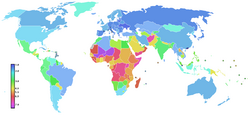(moving section to Climate change) |
(merge proposal) |
||
| (4 intermediate revisions by one other user not shown) | |||
| Line 1: | Line 1: | ||
{{merge to|Population management}} | |||
[[File:Fertility rate world map 2.png|thumb|right|250px|Global fertility rates]] | [[File:Fertility rate world map 2.png|thumb|right|250px|Global fertility rates]] | ||
The '''population growth''' is the speed in which a population increases. | The '''population growth''' is the speed in which a population increases. | ||
| Line 4: | Line 6: | ||
==Effect of population growth== | ==Effect of population growth== | ||
===In regards to climate change=== | ===In regards to climate change=== | ||
There is a popular myth that population growth alone determines our impact on the environment. In reality though, it is the combination of both the population size, as the (degree of) [[Consumerism|participation of each member on the economy]], as the way in which each member chooses to use this wealth<ref>Ie someone with millions of $ on his bank account can decide to park it there untill he dies</ref><ref>Ie someone with a limited budget can still have a major negative impact on the environment, ie by starting a forest fire, and/or can also have other negative impacts (ie by disposing all his organically non-decomposable waste in the environment (littering), ...</ref> | {{Main|Developing countries}} | ||
There is a popular myth that population growth alone determines our impact on the environment. In reality though, it is the combination of both the population size, as the (degree of) [[Consumerism|participation of each member on the economy]], as the way in which each member chooses to use this wealth<ref>Ie someone with millions of $ on his bank account can decide to park it there untill he dies</ref><ref>Ie someone with a limited budget can still have a major negative impact on the environment, ie by starting a forest fire, and/or can also have other negative impacts (ie by disposing all his organically non-decomposable waste in the environment (littering), ...</ref> that determines this. | |||
==See also== | ==See also== | ||
* [[Population size]] | * [[Population size]] | ||
==Notes and references== | ==Notes and references== | ||
| Line 24: | Line 16: | ||
== External links == | == External links == | ||
* [http://www.economist.com/opinion/displayStory.cfm?story_id=14744915&source=hptextfeature Falling fertility], ''The Economist'', Oct 29th 2009. Argues that there is little more to be achieved in developed countries through population policy, as growth is already falling about as fast as can be expected. Thus emissions reductions in these countries must come through technology and governance. | |||
* [http://www.economist.com/opinion/displayStory.cfm?story_id=14744915&source=hptextfeature Falling fertility], ''The Economist'', Oct 29th 2009. Argues that there is little more to be achieved through population policy, as growth is already falling about as fast as can be expected. Thus reductions in | |||
{{attrib|url=http://www.urbansprout.co.za/population_growth_has_no_relation_to_global_warming|author=Ahmed|license=CC-BY-SA}} | |||
[[Category:Ecological footprint]] | [[Category:Ecological footprint]] | ||
Revision as of 20:08, 18 August 2015

The population growth is the speed in which a population increases.
Effect of population growth
In regards to climate change
There is a popular myth that population growth alone determines our impact on the environment. In reality though, it is the combination of both the population size, as the (degree of) participation of each member on the economy, as the way in which each member chooses to use this wealth[1][2] that determines this.
See also
Notes and references
External links
- Falling fertility, The Economist, Oct 29th 2009. Argues that there is little more to be achieved in developed countries through population policy, as growth is already falling about as fast as can be expected. Thus emissions reductions in these countries must come through technology and governance.
- ↑ Ie someone with millions of $ on his bank account can decide to park it there untill he dies
- ↑ Ie someone with a limited budget can still have a major negative impact on the environment, ie by starting a forest fire, and/or can also have other negative impacts (ie by disposing all his organically non-decomposable waste in the environment (littering), ...